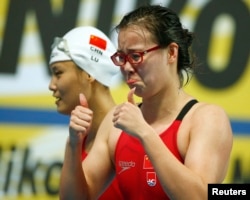China is in love with Olympic swimmer Fu Yuanhui and it is not because of the medals she has won, but the way the joyful and goofy 20-year-old has handled herself on the global stage at the games in Rio de Janeiro.
Her exaggerated expressions and happy nature have turned her into an overnight online celebrity in China. And that has whipped up a whirlwind of discussion about her strong individual personality and the true meaning of success at the summer games.
Huh?
Success came as a surprise for Fu, so much so that she didn’t even realize she had placed third in the 100-meter backstroke final until a reporter told her she had won the bronze.
In a video-taped interview that has gone viral on social media and racked up more than 1.5 million views on YouTube, Fu explains to a reporter that she was .01 seconds slower than the swimmer who won the silver because her “arms are too short.”
She told the reporter that while “I didn’t win first place. I’ve already surpassed myself and I am happy with that.”
But when she went on to say that even though she “did not win a medal…” the reporter corrected her, telling her she had won the bronze, Fu looked around in shock and said: “Huh?... What? Third Place”… “I didn’t know!”
She added, “Well, then I think that’s not bad at all!”
Online celebrity
It’s not just what Fu has said in interviews but also her hilarious and animated expressions that have won her millions of fans this week and made her an online sensation.
Her social media account on China’s boomed from several hundred thousand to about five million over the past few days. And when she did a live broadcast on a Chinese mobile phone app, more than 10 million tuned in to watch.
“Fu Yuanhui is so popular because she is able to express her true inner feelings and that makes people feel like she is an actual live person rather than an answering machine that spouts off official rhetoric,” wrote one Weibo user.
Her antics have also led many to take a bigger and broader look at the Olympics, China and the country’s decades long obsession with the quest for gold medals.
“In the past, most Chinese athletes carried the burden of the "glory of the nation." They cried and apologized when they did not win the gold medal,” wrote another Weibo user.
“Nowadays, as China has become stronger it no longer needs gold medals to prove itself, and it seems people are to enjoy the real Olympic spirit and are less likely to criticize athletes for not winning the gold medal.”
Just in time
Her growing popularity has not only won her friends and fans at home, but overseas as well. It has also helped draw attention away from the kind of controversies that typically plague China at the Olympics.
Some even believe she could help change the face of Chinese swimming. A boost China urgently needs.
While Fu stirred discussion this week, it helped overshadow a nasty spat between Chinese swimmer Sun Yang and Australian Olympian Mack Horton.
On Friday, the official Xinhua news agency reported that Chinese swimmer Chen Xinyi tested positive for a banned substance.
Gold fever
China’s state-media have long perpetuated the country’s obsession with winning gold medals and the link they see between first place and national strength. The games have also served as a good source of propaganda for the party. But as Fu’s popularity has spread this week, some were highlighting the waning importance of China’s obsession with winning gold medals.
An article in the People’s Daily online, a mouthpiece for the Communist Party, entitled “Fu Yuanhui: an athlete who actually enjoys sports” did not focus on the role the state had played in Fu’s development as a swimmer, but her family and how they contributed to her joyful and down to earth personality.
A report about Fu published by a popular Chinese language newspaper in the country’s capital, the Beijing News said that: “while medals are still important, it seems like we don’t care about them as much as we did in the past.”
Changing views
Communist-led China won its first gold in the 1984 Olympics and a little more than two decades after that Beijing placed first in the medal ranking when it hosted the Games in 2008. At the Beijing Olympics, China nabbed 51 gold medals and 100 in total.
During the London Olympics in 2012, China’s overall medal total slipped to 88.
China spends billions of dollars on its Olympics program. And from a very young age, many athletes train and live together with their teammates separated from their families in their quest for Olympic gold.
Some see Fu’s popularity as a sign that things are changing.
In the past “when they (athletes) won competitions or received high scores, they thanked the party and the state first,” said online commentator Jia Jia. “The first priority was their political responsibility.”
But that is increasingly not the case. And that is not a bad thing, Jia Jia adds.
“If we win the most medals, that should imply that sports are for all people in China and that there is wide participation, not that success is a linked to state power,” he said.












